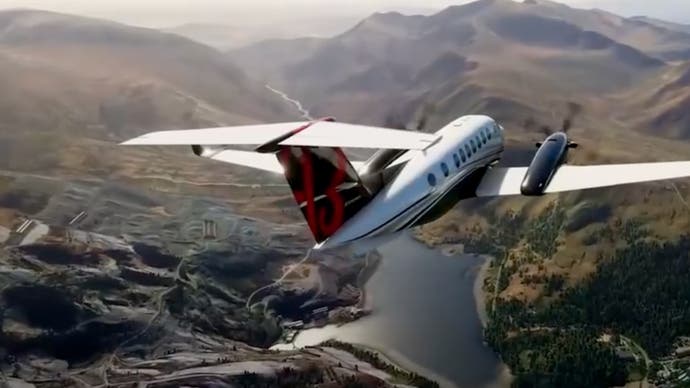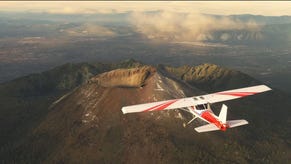Asobo on bringing Flight Simulator's breathtaking world to everyone via Xbox Cloud Gaming
As streamable version launches today.
There surely can't be many that haven't been seduced by Flight Simulator's promise of a whole, beautiful world to explore whenever and wherever they choose. Developer Asobo's astonishing work at recreating the planet on a 1:1 scale has transcended the usual simming niche to present a proposition - a sort of virtual holiday on a harddrive - with genuine mass appeal. But there remains a key sticking point: hardware. Flight Simulator on PC is an absolute hog, even at its more modest settings, and the secondary route - namely Xbox Series X/S - has its own cost and availability barriers to contend with. There is, then, a whole untapped audience Asobo believes is eager to take to the skies - and that's where Flight Simulator's newly released Xbox Cloud Gaming edition comes in, making the experience available to anyone with an Xbox Game Pass Ultimate subscription and an internet connection.
Watching head of Flight Simulator Jorg Neumann pick up his phone over webcam and, within 30 seconds, be soaring majestically over Flight Simulator's breathtaking rendition of central London elicits almost as much of a giddy thrill as seeing those first glorious trailers all those years ago - particularly from the perspective of a PC player like me whose mid-range GPU has never quite been up to the challenge of running the sim, even after contending with its 200GB+ footprint and tortuously long install and load times. Up until now, Asobo has only really talked about Flight Simulator's cloud support in terms of Microsoft's last-gen console, Xbox One, but it's a proposition likely to be welcomed by anyone looking for a simpler, smoother, faster way to experience the sim and its World Updates, whether on Xbox, PC, or mobile.
It's certainly impressive to see Flight Simulator's rich rendition of the world running on a device the size of someone's hand - and at a solid 1080p/30fps too - and it's a technological feat borne of Asobo work on Flight Simulator's acclaimed Xbox Series X/S port last year. "We launched in 2020 on PC and I think people were pretty impressed with what it looked like," explains Neumann. "But it was a 150GB download, it was 30GB in memory, and it took us a while to get that over to Xbox Series X and S simply because of the amount of data - many people thought it was impossible - and then when you look at Xbox One, or even further down the tech stack, there's just no memory for anything. So what we did on Series X and S was we started to put more and more stuff into the cloud [and] once that worked, we had basically won the battle, because what we have in the data centres in Azure is Xbox Series X and S machines, so now you have the entire game essentially streaming ready." From that point, Neumann says it took "one dev and half of a UI guy" just a few months to get the cloud version ready for release today.
And the end result, says Neumann, has the power to be transformative. "Flight simming seemed so far away for so many people for so long," he says. "It was basically a genre that was dedicated to the PC only and typically required a really beefy PC to even run...But I think you just need to have an entry point to fall in love with something, and I think what we've done on Xbox is we found a very large, interested audience. I was kind of not sure how long were they going to stick around - are they just going to visit the house and get out? - but I would say...hundreds of thousands if not millions, actually stuck around. I wouldn't call them core simmers yet, but I think they have at least fallen in love, tasted the thing. So what cloud gaming does really is democratise this...because it works on the machines you already own."
"My wife was not at all a simmer," Neumann offers as an example. "The first time she got interested [in Flight Simulator] was when it was on Xbox, because she's like, 'Oh, that is pretty', because it was on the big TV, not my work PC. And then my daughters are like, 'Oh, that looks fun', and now we can actually all sit in the same room on different devices...So we could, for instance, go, 'Hey, we're going to Hawaii in a few weeks, let's check out where we want to go'. I think it opens up quite a lot of scenarios. When Phil [Spencer] sometimes talks about wanting to reach 3 billion gamers, I always thought that's a lot of gamers. But it becomes believable now that I've seen how well this works on phones...You know, they will not all become simmers, there are no delusions about that, but they can at least try it."
And Neumann sees major advantages for the development of Flight Simulator itself too. "I can say I've been simming more this last few weeks on my phone than on my PC," he explains. "Because typically, I have to move a bunch of data around [and] as you know, harddrive space at some point becomes really painful to manage. And when say an artist wants to put a fix up, he says, 'Hey, Jorg, can you go check this out?' and literally it takes me 15 seconds now...friction-free development is a beautiful thing. Packaging up and sending it to your Xbox, that takes hours of your day. And we're right at the beginning of feeling it. But I talk to our testers - we're working on Top Gun Maverick right now, to finish everything up for the launch in three months - and the testers are playing on phone. It's crazy. Totally unexpected."
And the future appears bright for Flight Simulator. Not only is Asobo thinking about expanding its new cloud version with the likes of keyboard, mouse, and touch support, it's also preparing for the sim's next major World Update - this time giving the makeover treatment to Iberian countries including Spain, Portugal, Andorra, and Gibraltar. Then there are helicopters and gliders, both coming to the sim as new modes of transportation, plus the Top Gun expansion which, following on from last year's competitive multiplayer-focussed Reno Air Races DLC, is yet another example of Asobo finding ways to expand its sim in a more mainstream direction. I ask Neumann just how far Asobo thinks it can comfortably keep pushing Flight Simulator away from its niche without alienating its core audience.
"I always said we made this for core simmers," he replies. "That was the most important thing. Those are the people who love [Flight Simulator] and have been loyal for decades. But I think the core simmers now actually ask a lot of questions like, 'Hey, can we get the mission back that you had in Flight Sim 10?'. They love the sandbox, they play every day, but they would like it if it had a little bit more purpose beyond the purpose that they give it. That much is clear. And I feel very safe, as long as it's an authentic aviation experience."
"So you know, the Reno thing is interesting," Neumann continues, "because some people said, 'There they go, it's a game'. Well, no, because I actually spent almost two years talking to Reno pilots. And right after we launched last November, 18 of them wrote me a long email saying, 'Jorg we've played it and it's exactly like what we're doing in the real world'. I've sent all these emails to the team. And I was like, guys, look, we did it. We represented aviation correctly. And it's authentic. And everybody's feels great about that. So I think we're thinking about this a lot. How far do we go to make it game-y? And I think the answer is it's not going to be a game. But I think it's going to be activities that are very true to how people in the real world are aviators."
"We have real-time weather, we have seasons, real-time everything. And that's what's so cool about the product, where people go and storm-chase a hurricane or they go check out certain things that are happening in the real world - there was a volcano that broke out in Indonesia [and people went to see if] the volcano was also in Flight Sim. And the answer is not quite yet. But this is something we want to do. And then you have aircraft. And we have real-time air traffic, the scenarios of what feels right to aviation are right in front of you. I actually spent time on a job board [for pilots in Hawaii] the other day, and they post jobs like, 'Hey, can anybody get this cargo from here to there?'. And then people said, 'Yup, I have my Chopper ready, let's go.' But we want to do it on a global scale, which is just a fascinating challenge."
Of course, with Asobo having previously spoken in terms of a ten-year development cycle for Flight Simulator, some of its more ambitious ideas may still be some way off. For now, with the sim's two year anniversary on the horizon, Neumann says the team feels good about where things currently stand. "When we first started," he says, "Flight Sim had been gone for a good long time, so I think at first it was like, do they get it? Are they the real thing? And we tried hard to be very open... We listen a lot to what players want...and then a lot of our development is based on what they're telling us they need, because they're oftentimes more knowledgeable than we are about certain things. So I think the core simmers have really accepted us. And they see that we're sort of the genuine article. So I think we are well on our way.
"We feel really welcome by community," he continues. "I think there was an incredible amount of humbling praise given. And we're very well aware of this, that we are living up to very high expectations. When we started, we always said, we're standing on the shoulders of giants and that's true. We had the code base of Flight Sim 10, which was the result of people working on Flight Sim for, at that time, 35 years. So it's not like we did everything from scratch. And, you know, we are the inheritors of a great heritage. And we're trying to evolve."











